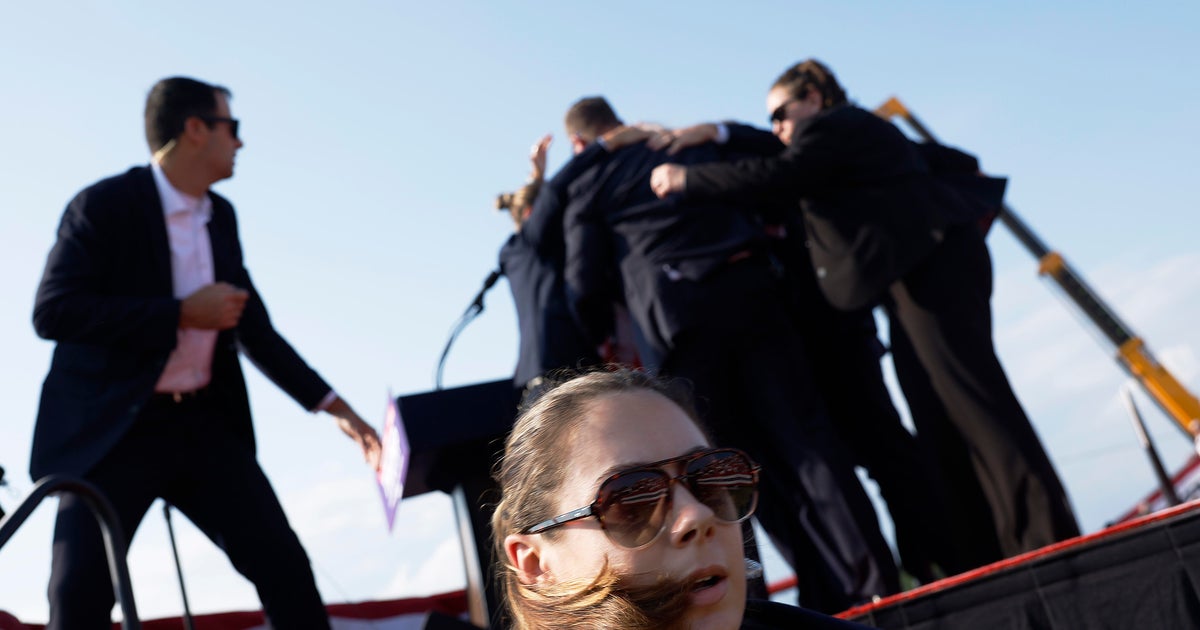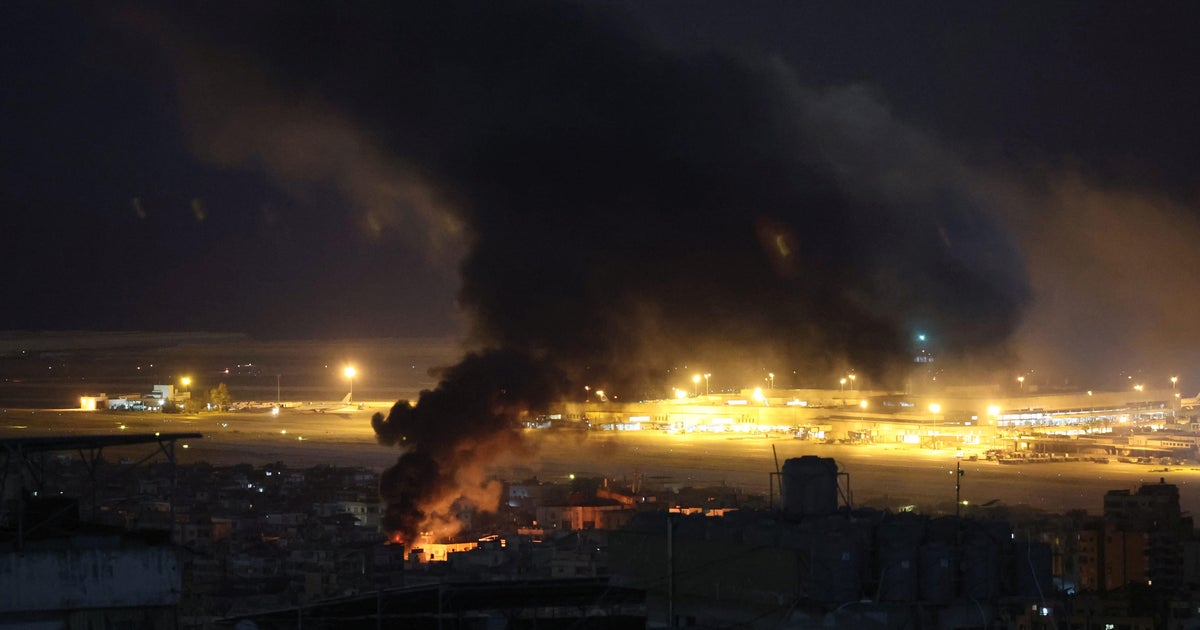CBS News
Keri Russell pulls back the curtain on “The Diplomat”

Keri Russell, literally acting as U.S. ambassador, was deftly balancing yet another diplomatic crisis, in a rented manor, with prop champagne. And the plot, while plausible, was scripted. Asked whether it was over-glamourized, Russell replied, “The diplomatic world? Well, yeah, it’s TV! You’ve got to over-glamorize it! Everything takes so long!“
But “The Diplomat” moves. In its first season, Russell’s character, Kate Wyler, was thrown into her role of United States Ambassador to the United Kingdom (no pesky Senate confirmation required), and literally tussles with her opinionated former ambassador-husband (played by Rufus Sewell). The storyline parallels current events, including Iran and a resurgent Russia.
“It’s just a world that we kind of don’t know that much about, which is really interesting,” Russell said. “I think the State Department, in general, they’re doing their job well when we don’t hear about them. It’s fun to get to peer a little bit behind the curtain.”
“Sunday Morning” got to peer behind the curtain of this hit Netflix show while they were shooting Season 2, to be released later this month. In a grand room, by a table prepared for a feast, were temporary office of series creator Debora Cahn. While filming commenced, she kept taking notes. “Reminding myself to, in future scripts, follow up on something that’s planted here,” she said.
CBS News
The writer-producer has built a career making the politics, dealmaking and diplomacy of Washington sexy for TV audiences – in the CIA drama “Homeland,” and before that, the White House, with “The West Wing.”
“I was sort of raised on ‘The West Wing’ as a writer,” Cahn said, “and loved that there was a way to talk about things that mattered in the world, but without making it feel sort of preachy or expositional. I thought that was just an incredible magic trick, and I really wanted to do the foreign policy version of that.”
Doane asked, “Will you open the newspaper now and say, ‘Ooh, this could be a good storyline for ‘The Diplomat’?”
“Every single day,” Cahn replied.
Asked to react to criticism that “The Diplomat” has over-glamorized the workings of the State Department, Cahn said , “I’m okay with that. They could use a little glamorizing! I mean, they work really hard and they do good stuff – and absolutely nobody has any idea what they do.”
Russell became familiar to TV audiences in the title role of “Felicity,” a drama about college life. More recently, in the thriller “The Americans,” she played a Russian spy. “‘The Americans’ was so, like, stylized in a way, or at least my character was,” she said. “It was all, like, mood and vibe, kind of. And this is much more ‘Fraggle Rock’ – I’m always, like, spazzing out and saying things a million miles a minute and all of that. It is such a different gear, and it’s such a fun different gear to play.
“The pace is fast. I think the diplomatic nature of the dialog is muscular and quick and, you know, fun, if you can get it!”
CBS News
Jane Hartley, the real U.S. Ambassador to the United Kingdom, says Russell is “absolutely perfect” in the role.
“One of the things I love about the show is, one, it is a female ambassador to the U.K., and I am the second female ambassador to the U.K. – two in 200 years,” Hartley said.
Doane asked, “It must be interesting to have a spotlight shone on what you do?”
“You know, when I heard about it, first, I was worried,” Hartley said. “I wanted to make sure that it got the substance right, and I think they do.”
She admits that she had been slightly involved: “They’ve checked with me on things,” she said. “If you come up to my office on most days, it’s pretty frenetic. We’re pretty busy. Phones are ringing, people are running, papers are being shoved. And if you watch your show, it’s the same thing. So, they get the intensity right.”
Asked what she had learned from the real-life diplomats, Russell said, “They’re kind of unflappable, and I think that’s what you have to be. You have to be really good in crisis, and know how to manage many different types of people. And I think Jane really has that.”
The ambassador took “Sunday Morning” around the real Winfield House (the official residence of the U.S. ambassador in London’s Regent’s Park), and told us there is one problem: Some visitors to the residence who’ve seen the show are expecting something more familiar. “They’ll walk in, and I can see them looking around and looking around, and I can see them thinking, Well, this isn’t how it is on this show!” Hartley said.
CBS News
Hartley says folks in the foreign service are definitely watching, and she’s not the only one wondering if this TV show might spark interest in the next generation of diplomats. “You never know what’s going to touch people,” she said.
Russell added: “It’s like a little look-in, and maybe it’ll get, I don’t know if the smart kids at school go, Oh, I’d like to do that. That’s what I think it could be a little eye-opening. Like ‘Felicity’ recruited kids for NYU, maybe this will recruit diplomats to work in the State Department.”
To watch a trailer for Season 2 of “The Diplomat” click on the video player below:
For more info:
Story produced by Erin Lyall. Editor: Brian Robbins.
CBS News
House panel finds Trump assassination event “preventable” in interim report

Washington — The bipartisan House task force investigating the assassination attempt against former President Donald Trump found that the incident was “preventable,” detailing in a report released early Monday that there were communication and planning shortcomings.
In the 53-page interim report, the panel outlined that “the evidence obtained by the Task Force to date shows the tragic and shocking events of July 13 were preventable and should not have happened.”
The probe “clearly shows a lack of planning and coordination between the Secret Service and its law enforcement partners before the rally,” the task force said, noting that the findings are preliminary.
House leaders announced the members of the bipartisan task force on July 29, after the House voted to establish the panel, who are tasked with looking into what went wrong on July 13, while making recommendations to prevent a similar attack from occurring. The panel is made up of seven Republicans and six Democrats. The lawmakers will submit a final report of its findings by Dec. 13, and is among several probes by lawmakers, law enforcement and federal agencies looking into the shooting.
This is a breaking story. It will be updated.
CBS News
Israel’s war with Iran-backed Hezbollah escalates as IDF bombs financial institutions across Lebanon

A fresh wave of Israeli airstrikes started pounding locations across Lebanon on Sunday night, some striking dangerously close to Lebanon’s only international airport. Israel had said it would launch a widescale assault on a banking institution it regards as Hezbollah’s de-facto financial arm, the Al-Qard Al-Hassan Association.
The strikes began a day after a drone targeted Israeli Prime Minister Benjamin Netanyahu private residence in the central town of Caesarea. He and his wife weren’t there at the time and there were no casualties, but Netanyahu released a statement on Saturday saying, “the attempt by Iran’s proxy Hezbollah to assassinate me and my wife today was a grave mistake.”
Sunday night, explosions rocked Beirut as the Israeli strikes targeting Al-Qard al-Hassan began.
Ugur Yildirim/dia images/Getty
The Israel Defense Forces said in a statement Monday morning that the institution “directly funds Hezbollah’s terror activities, including the purchase weapons and payments to operatives.” The IDF said the Iran-backed, U.S. and Israeli-designated terrorist group has “billions of dollars” stored in its branches across Lebanon, “including money that was directly held under the name of the terrorist organization.”
The IDF said its strikes hit Al-Qard al-Hassan targets in the capital Beirut, in southern Lebanon, and “deep within Lebanese territory,” in addition to ongoing strikes in the south that it said had hit 15 Hezbollah missile launchers that were targeting “the communities of northern Israel.”
The IDF said “numerous steps were taken to mitigate the risk of harming civilians, including advance warnings issued via different platforms to the civilian population in the area.”
But with every new strike, already-overwhelmed hospitals are put under even greater pressure, and more people are forced to flee their homes. Lebanese officials say 1.2 million people across the country have been displaced by war that escalated sharply one month ago, with the beginning of the intense Israeli airstrikes.
Anger and fear for the future grips Lebanese civilians
Displaced Lebanese civilians have set up makeshift shelters wherever they can find a patch of ground they believe will be safe.
CBS News met Hussein Hamieh holding his tiny son, just over a month old, outside the tent he’d pitched along Beirut’s popular beachfront. He fled his home in Beirut’s southern suburbs, an area long considered a Hezbollah stronghold, which has come under repeated attack since mid-September.
The ongoing strikes have only hardened his resolve, and his anger.
“I had to flee because we are dealing with a merciless enemy,” Hamieh said. “They fire rockets at us, I was forced to leave my home.”
CBS News/Agnes Reau
“We will win, and as long as we live in our country, we will have victory,” he told CBS News. “We will endure famine, rain, the sea or snow, and we can live under the trees, but we won’t leave our land.”
Beirut resident and artist Mona Jabour said she was worried about the long-term damage this war would inflict on everyone in the country, especially younger generations.
“People are going through hell,” she said. “Everything is crumbling under our feet… It’s just a disaster to see that young people are being brought up on violence and wars, and this is going to perpetuate new hatred, new wars.”
“These kind of wars, in 2024, should not even be allowed,” she told CBS News. “They are bombing each other, and these wars cost a lot — the money spent on arms could be spent a lot more wisely and constructively, to educate, to build homes, to improve third-world nations, to create more safety. I think people should wake up to the harm that is being done.”
CBS News/Agnes Reau
Netanyahu’s government launched its assault on Hezbollah in September, saying it would continue until the group was no longer able to launch rockets and drones across Lebanon’s southern border at Israeli communities. Hezbollah has launched well over 10,000 weapons at Israel in support of Hamas, its Iranian-backed ally in the war-torn Gaza Strip, over the last year.
U.S. sends Israel missile defense system, tries to “dial down the tensions”
Most of those Hezbollah rockets and drones are shot down by Israel’s missile defense systems, and Iran itself has also launched two ballistic missile salvos at Israel over the last year in response to the assassination of its senior commanders and allies. The region has been on tenterhooks since Netanyahu vowed to make Iran pay for the last missile attack on Oct. 1, which didn’t cause any casualties.
In anticipation of Israel’s looming response — and any potential Iranian counter-response — the U.S. has sent Israel a new missile defense system. U.S. Secretary of Defense Lloyd Austin said Monday that the Terminal High Altitude Area Defense (THAAD) system had arrived in Israel, along with a small contingent of about 100 American troops.
“We have the ability to put it into operation very quickly,” Austin said during a visit to Ukraine’s capital.
The Biden administration has made it clear that it would not support an Israeli counterattack that targeted Iran’s nuclear facilities or oil infrastructure, but Austin indicated Monday that Washington was still unsure exactly how far Netanyahu’s government would go.
“It’s hard to say exactly what that (Israeli) strike will look like,” he said. “At the end of the day, that’s an Israeli decision, and whether or not the Israelis believe it’s proportional and how the Iranians perceive it, I mean those may be two different things.”
Austin said the U.S. would “continue to do everything we can… to dial down the tensions and hopefully get both parties to begin to deescalate.”
As part of those ongoing efforts to halt the escalating tit-for-tat between Israel and Iran’s proxy groups in Lebanon and Gaza, senior White House envoy Amos Hochstein was in Beirut Monday to meet with Lebanon’s care-taker prime minister and the speaker of the country’s parliament, a Hezbollah-allied lawmaker who’s negotiated on behalf of the group.
A U.S. official told CBS News that Hochstein would be “pursuing an enduring arrangement that will bring a durable end to the conflict.”
contributed to this report.
CBS News
Condoms, other over-the-counter birth control methods should be fully covered by insurance, White House says

Washington — People with private health insurance would be able to pick up over-the-counter birth control methods like condoms, the “morning after” pill and birth control pills for free under a rule the White House proposed Monday.
Right now, health insurers must cover the cost of prescribed contraception, including birth control or even condoms that doctors have issued a prescription for. But the new rule would expand that coverage, enabling millions of people on private health insurance to pick up free condoms, birth control pills or “morning after” pills from local storefronts without a prescription.
The proposal comes days before Election Day, as Vice President Harris affixes her presidential campaign to a promise of expanding women’s health care access in the wake of the U.S. Supreme Court’s decision to undo nationwide abortion rights two years ago. Harris has sought to craft a distinct contrast from her Republican challenger, Donald Trump, who appointed some of the justices who issued that ruling.
“Today’s announcement builds on the Biden-Harris Administration’s strong record of defending access to reproductive health care and commitment to ensuring that women have the freedom to make deeply personal health care decisions, including if and when to start or grow their family,” Jennifer Klein, the director of the White House Gender Policy Council, said in a statement.
Klein said the administration “is taking bold action to expand coverage of contraception for the 52 million women of reproductive age with private health insurance.”
The emergency contraceptives that people on private insurance would be able to access without costs include levonorgestrel, a pill that needs to be taken immediately after sex to prevent pregnancy and is more commonly known by the brand name “Plan B.”
Without a doctor’s prescription, women may pay as much as $50 for a pack of the pills. And women who delay buying the medication in order to get a doctor’s prescription could jeopardize the pill’s effectiveness, since it’s most likely to prevent a pregnancy within 72 hours after sex.
If implemented, the new rule would also require insurers to fully bear the cost of the once-a-day Opill, a new over-the-counter birth control pill that the U.S. Food and Drug Administration approved last year. A one-month supply of the pills costs $20.
Federal mandates for private health insurance to cover contraceptive care were first introduced with the Affordable Care Act, which required plans to pick up the cost of FDA-approved birth control that had been prescribed by a doctor as a preventative service.
The proposed rule expands on that mandate.
It’s being proposed by the Departments of Health and Human Services, Labor, and the Treasury and would come into effect in 2025 if finalized, the Reuters news agency reports.
It wouldn’t impact people on Medicaid, the insurance program for the poorest Americans. States are largely left to design their own rules around Medicaid coverage for contraception, and few cover over-the-counter methods like Plan B or condoms.










